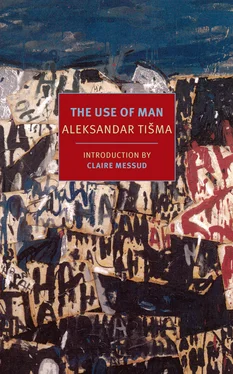Aleksandar Tišma - The Use of Man
Здесь есть возможность читать онлайн «Aleksandar Tišma - The Use of Man» весь текст электронной книги совершенно бесплатно (целиком полную версию без сокращений). В некоторых случаях можно слушать аудио, скачать через торрент в формате fb2 и присутствует краткое содержание. Год выпуска: 2014, Издательство: NYRB Classics, Жанр: Современная проза, на английском языке. Описание произведения, (предисловие) а так же отзывы посетителей доступны на портале библиотеки ЛибКат.
- Название:The Use of Man
- Автор:
- Издательство:NYRB Classics
- Жанр:
- Год:2014
- ISBN:нет данных
- Рейтинг книги:5 / 5. Голосов: 1
-
Избранное:Добавить в избранное
- Отзывы:
-
Ваша оценка:
- 100
- 1
- 2
- 3
- 4
- 5
The Use of Man: краткое содержание, описание и аннотация
Предлагаем к чтению аннотацию, описание, краткое содержание или предисловие (зависит от того, что написал сам автор книги «The Use of Man»). Если вы не нашли необходимую информацию о книге — напишите в комментариях, мы постараемся отыскать её.
A work of stark poetry and illimitable sadness,
is one of the great books of the 20th century.
The Use of Man — читать онлайн бесплатно полную книгу (весь текст) целиком
Ниже представлен текст книги, разбитый по страницам. Система сохранения места последней прочитанной страницы, позволяет с удобством читать онлайн бесплатно книгу «The Use of Man», без необходимости каждый раз заново искать на чём Вы остановились. Поставьте закладку, и сможете в любой момент перейти на страницу, на которой закончили чтение.
Интервал:
Закладка:
Sredoje said this was because of the strength of their love, which, he had read somewhere, could dull or completely eliminate lust. Vera didn’t like his explanation, not because she did not believe it, but because his talk of love and lust made her uneasy. She wanted only to play, not to think or analyze, pretending she had gone back ten years or more. She was even unwilling to hear Sredoje’s dreamy memories of the attraction they had felt for each other years before. Better for their love to have no past and be all in the present. And when Sredoje made her recall the snowball fight, how he had saved her from her attackers and then kissed her, she refused to believe it. No, boys had never attacked her with snowballs, and he hadn’t kissed her, and at parties she had danced with Milinko, her boyfriend, and with no one else. That was their first disagreement.
The second was about the diary. After they had touched and caressed it as an object precious to them both, and opened it at random to a familiar word, a familiar sentence, one afternoon they sat down to read it together from beginning to end. They were surprised — first, by how short it was. And, read aloud, word by word, many passages were unclear, confusing, something they had never noticed when they read the diary to themselves.
They wondered who Kleinchen was, Fräulein’s great love. The man Sredoje had seen once when he arrived for his lesson, who sat at a distance from the table with his hat in his lap? But the stranger had seemed awkward and old, unkempt, possibly even unshaven. When Sredoje saw him, he felt that he had intruded on something extremely private. Or was Kleinchen one of the people around her to whom they never paid attention, but whom they had seen show up at her funeral? And what did the word mean? Was it a diminutive of the surname Klein, as Vera thought, or a term of endearment, “little one”?
Klein was as a rule a Jewish name, Sredoje observed. Had Vera noticed the anti-Semitism in the diary? Vera denied that. Sredoje picked up the notebook and leafed through it until he found and read to her the entry for May 4, 1936: “I don’t like his kind. Especially Jews.” Vera retorted that he hadn’t understood it properly: Fräulein didn’t like men who told lies, particularly if they were of a different origin, not because they were of a different origin. Besides, Klara, whom Fräulein visited, most probably her landlord’s daughter (who was a Klara, Vera remembered), was also Jewish, as was Böske, whose wedding Fräulein attended. Then there were the lectures she went to at the Novi Sad Cultural Club, which had Jewish patrons.
Sredoje ascribed that to a snobbish inconsistency on Fräulein’s part. He cited her liking for “The Merry Widow” and “Der Pfarrer von Kirchfeld,” a film he remembered as highly nationalist, and which had drawn from Fräulein the exclamation, “The people, nature, loving eyes!” Vera insisted that that meant nothing. Anyway, the Jews did have some unpleasant traits. She, a Jewess, knew that better than anyone. But to criticize them for these traits did not mean anti-Semitism.
In this way the war crept into their conversation, and it was inevitable that they should share with each other their experiences of it. Sredoje told of his life as a soldier, the circumstances surrounding the deaths of his parents, and Vera told of Gerhard’s suffering in prison and how her father, her grandmother, and she were taken to the camp. They became exceptionally attentive to each other: Vera met Sredoje halfway when it was time for him to visit, and he brought her small gifts — candies, or pretty buttons, which he searched for in the shops (he noticed that she changed them often on her dresses), or a pack of cigarettes.
When winter arrived, each tried to soften it for the other. Since Sredoje’s room was chilly (he told her this; he never took her there), they agreed that after the lessons with his pupils, he should spend his free time in her room. Vera made sure to light the fire early to warm the room; she found an old woolen plaid scarf and gave it to him carefully washed and ironed. Sredoje drank less. Through the father of one of his pupils he even managed to get some coal for her. In the evening, it was their custom not to light the lamp, but to watch, their arms around each other, the red glow of the fire through the small cracks in the door of the stove. They said little. Their whole effort now was to combat the winter, which seemed to them an angry giant, for it was the first time in their lives that no other danger threatened them, the first time they had someone to care for. They covered each other, warmed each other with their breath and the palms of their hands. “Are you cold?” they would ask. “Are you comfortable? Do you need anything?” And when they parted, they exchanged advice on how to keep from catching cold.
Suddenly it was spring, with a sun not strong enough for them to do without heating but bright enough to make the closed-in room oppressive. They opened the windows wide to let out the smoke from the stove and the cigarettes, which burned their throats. They paused at a window and, hugging each other, watched the passers-by. But they avoided going out together, by unspoken agreement, reluctant to show themselves in public places after the humiliations they had suffered.
The streets were full of bustle that spring: people venturing out, paying more attention to their clothes. Brightly colored fabrics fluttered in the wind as motorcycles went by, and occasionally these were overtaken by a shiny new car. This modest burst of ostentation, of luxury, distressed Vera and Sredoje; they felt that they were being left behind, they felt the need to keep in step with life. Sredoje spoke of going back to school, Vera of finding work again. But they were afraid to put these words into action, afraid of losing what they had so unexpectedly gained, this companionship that scorned the world, this peace unassailable from outside. So they fell silent, but there was reproach in their silence. Sredoje looked at Vera out of the corner of his eye, at the object of his love, which separated him from his future, and he saw someone dear to him but not her worth.
And Vera looked at Sredoje and shared in the dissatisfaction. They paced the room.
Once again they picked up Fräulein’s diary, turned the pages, read passages, and discussed them. There was one completely incomprehensible allusion to “Berberin’s messenger.” Sredoje said he would look up the name in an encyclopedia in the public library, but he never got around to it. And who was Mila? Apparently Fräulein’s sister, whom she didn’t like very much, it seemed. And Egon, who replaced Kleinchen at one point? And Hirschl, who saw Egon’s postcard and “bellowed like a bull”? Sredoje said that Fräulein, if one read the diary carefully, was constantly surrounded by suitors — some platonic, like Egon, others aggressive, like Dr. G., who apparently had taken liberties with her during an examination. Thus there were both honorable and dishonorable admirers from whom she could have made her selection. Yet she chose none of them, not wanting to go “over the line ,” as she put it in one place. At the same time, she complained of loneliness, and that no one would shed a tear over her. Didn’t it seem to Vera that Fräulein’s diary, for all its tragic tone from beginning to end, was a farce if read against the background of the horrors that Fräulein had escaped? Because, when all was said and done, she had made her choice, whereas many — millions — had been given no choice.
In answer Vera shrugged and said that happiness and unhappiness could not be measured by fact but only by feeling, by the state of mind.
Sredoje could not accept that. If it was only a matter of state of mind, there would be no justice or injustice, no good or evil. What would Fräulein have said if, instead of the deprivation she imposed upon herself, she had been forcibly deprived — whether by others or by society — of the experience of love? Or if, the other extreme, she had been forced to accept love against her will, as Vera had been forced?
Читать дальшеИнтервал:
Закладка:
Похожие книги на «The Use of Man»
Представляем Вашему вниманию похожие книги на «The Use of Man» списком для выбора. Мы отобрали схожую по названию и смыслу литературу в надежде предоставить читателям больше вариантов отыскать новые, интересные, ещё непрочитанные произведения.
Обсуждение, отзывы о книге «The Use of Man» и просто собственные мнения читателей. Оставьте ваши комментарии, напишите, что Вы думаете о произведении, его смысле или главных героях. Укажите что конкретно понравилось, а что нет, и почему Вы так считаете.












